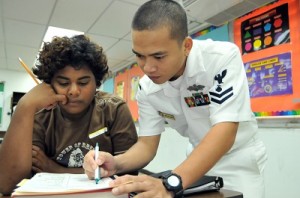Digital Tutors for Future Naval Scientists, Engineers


The Office of Naval Research (ONR) recently announced the next phase of an initiative to design affordable software to improve retention of science, technology, engineering and math (STEM) education among middle and high school students.
Funded by ONR’s Office of Research and its Warfighter Performance department, the STEM Grand Challenge will develop cost-effective digital tutors that can tailor STEM instruction to individual student needs. Ultimately, the technology will be used to improve the skills of Sailors and Marines, shoring up the naval science and engineering workforce for years to come.
The Department of the Navy is in need of naval architects, undersea weapons developers, cyber experts and others in related fields as more than half of the service’s science and engineering professionals will be eligible for retirement by 2020.
“We need to develop tools and technologies to make it easier to educate our next generation of STEM workers,” said Cmdr. Joseph Cohn, ONR’s deputy director of research for STEM. “To do that, we are investing in the entire pipeline of STEM worker development, from kindergarten to graduate school and beyond.”
Secretary of the Navy Ray Mabus has made STEM education a priority. Speaking at a 2011 conference sponsored by ONR, he unveiled a new STEM roadmap and promised to double the service’s budget for initiatives like the STEM Grand Challenge. The idea for an intelligent tutoring system has been decades in the making, said Dr. Ray Perez, a program officer in ONR’s Warfighter Performance department and co-manager, along with Cmdr. Cohn, of the STEM Grand Challenge.
Early on, researchers saw potential for technology that could outperform conventional instruction and improve the performance of students by two or more letter grades in a short period of time.
Four teams have received funding under the STEM Grand Challenge’s first phase. During a recent kick-off meeting, representatives from the University of Memphis, University of Massachusetts, Arizona State University and Raytheon BBN Technologies presented overviews of their distinct approaches to intelligent tutoring systems.
The teams’ technologies will be evaluated on their ability to improve students’ knowledge retention, reasoning and problem-solving skills. Up to two of the teams will be selected for additional funding to develop a system that can be used to educate Sailors and Marines.
source: The Office of Naval Research























